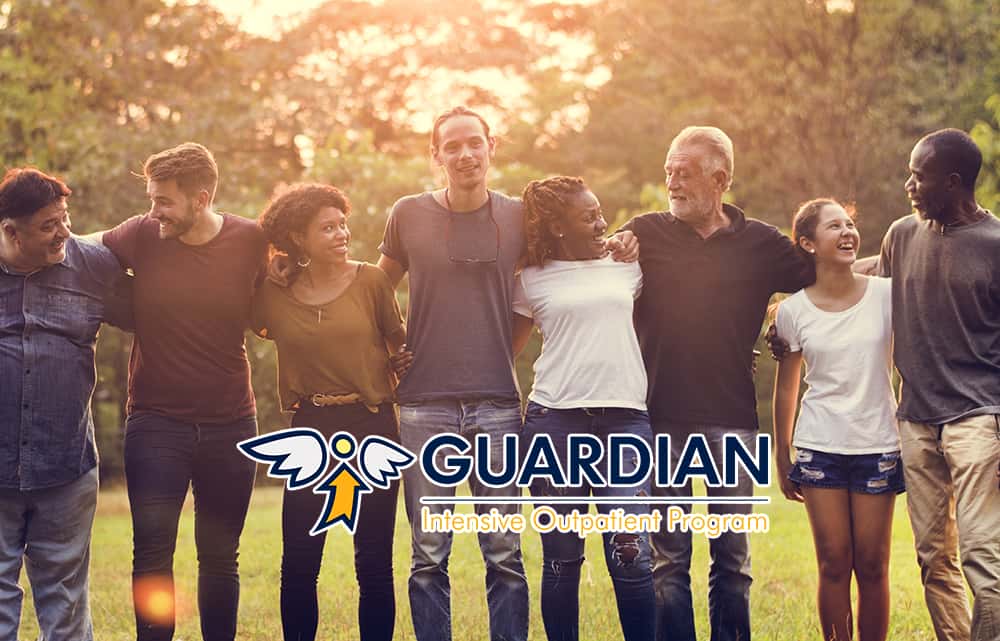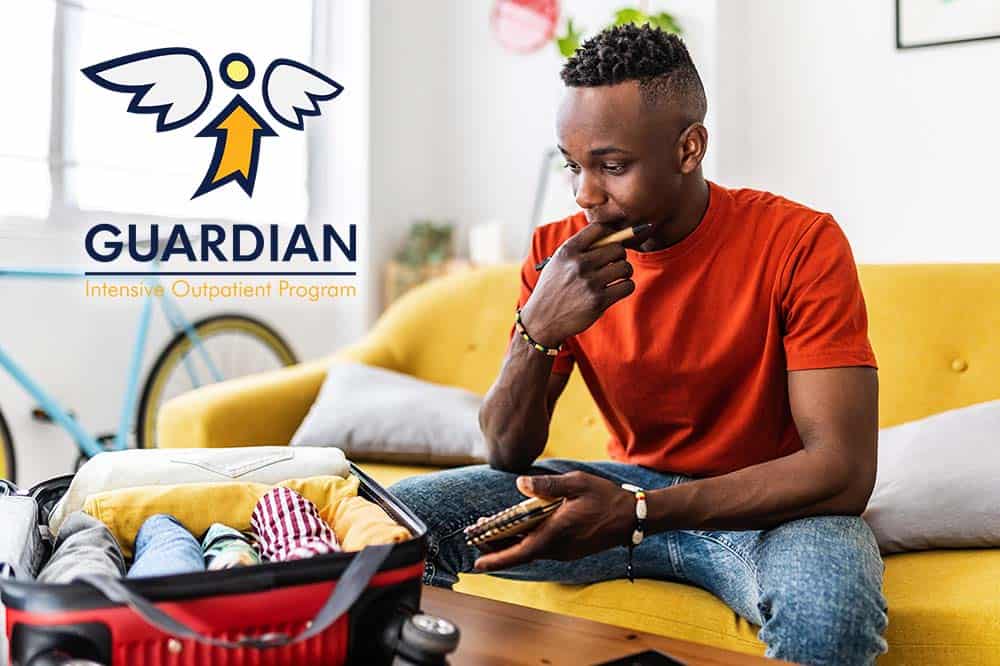Coping With an Addicted Loved One
Watching someone you love struggle with addiction is undeniably one of the most difficult things you will ever do. You might feel backed into a corner – you desperately want to help, but you feel like no matter how hard you try, you only end up pushing your loved one farther and farther away. Addiction is a complex and baffling disease. There is no straightforward answer, seeing as addiction recovery is far from a one-size-fits-all process. The good news is that there are several ways to help encourage your loved one to seek the professional treatment he or she so desperately needs, and that Guardian IOP is available to support you every step of the way.
The first step to take is educating yourself on substance abuse and dependence, and coming to thoroughly understand the Disease Model of Addiction. It might seem as if your loved one is simply on a path of unwavering self-destruction; as if he or she simply does not care about the consequences of his or her actions enough to truly attempt quitting. The Frontiers in Psychology recently published an article titled, “Free Will and the Brain Disease Model of Addiction: The Not So Seductive Allure of Neuroscience and Its Modest Impact on the Attribution of Free Will to People with an Addiction,” which explains the Disease Model and its implications thoroughly. According to the article, the “brain-hijack theory” is at the center of this model, and it suggests that addiction stems from malfunctioning please-seeking and reward systems within the brain. The article also suggests that understanding addiction as a disease will inevitably help decrease related stigmas and encourage men and women suffering from addiction to seek the help they need without experiencing blame-related shame.
If someone you love has been suffering at the hands of a substance abuse disorder of any severity, Guardian IOP is available to help 24/7. Contact us today for more information or to get started.
We Are Here For You
Let Us Help You Heal
Our Drug & Alcohol addiction treatment experience is second to none.
Learn how we can help by speaking with one of our Treatment Advisors today.
Signs That Your Loved One is Addicted
If you believe that your loved one might be struggling with addiction, there are several signs and symptoms to keep an eye out for. If you are interested in learning more, reach out to us today. The most telltale signs that your loved one is struggling with substance abuse and is in desperate need of professional treatment are as follows:
- He or she has been more secretive than normal, and has been isolating from friends and family and spending far more time alone.
- You catch your loved one being dishonest and lying about seemingly mundane things for no apparent reason.
- He or she experiences significant mood swings – one moment you are engaged in conversation and everything seems to be going well, the next moment your loved one is defensive, angry and agitated.
- He or she has been experiencing changes to appetite that typically result in noticeable weight loss or weight gain (weight loss is more common).
- Your loved one is fatigued throughout the day, and he or she often seems to have little or no energy (this could be partially attributed to disrupted sleep patterns).
- He or she has a lack of interest in hobbies and activities that were previously enjoyed, and little motivation to fulfill personal obligations or take care of responsibilities.
- Your loved one seems to experience unexplainable memory loss – you might have full-on conversations with him or her that are not remembered the very next morning (this is typically attributed to blacking out).
- Your loved one steals from you – he or she might steal money from your wallet, prescription medicine from your medicine or valuables to pawn (in order to support his or her drug habit).
If you have noticed any of the above-listed signs, it is a good idea to look into helping your loved one seek and receive the professional help he or she needs. For more information on how to do so, reach out to Guardian IOP today.

Our Drug & Alcohol Treatment Services Include
What Steps Can You Take?
If your loved one has been struggling with an addictive disorder, there are several steps you can take in order to help. We have outlined these steps below – but remember, recovery is not one-size-fits-all, and what works for one individual might not be as effective for another. For this reason it is important to contact a professional addiction specialist or trained internationalist and ask for a second opinion. Attempting to handle matters completely on your own can actually do more harm than good, and might push your loved one farther away from the road to recovery.
The steps we generally recommend taking:
- Educate yourself thoroughly on the disease of addiction.
- Help yourself first.
- Contact a licensed counselor for more information on helping an addicted loved one.
- Sit down with your loved one (while he or she is sober) and attempt to have an empathetic conversation with the goal of encouraging him or her to seek professional addiction treatment.
- If the conversation does not go as planned and your loved one grows angry or defensive, look into organizing a professionally staged intervention.
- Reach out to Guardian IOP to be put into touch with a licensed interventionist.
Ready To Begin Your Drug & Alcohol Treatment?
We Offer A Safe & Effective Program
Don’t let Drug & Alcohol addiction control your life.
Call us today and let’s get you started on the path to a better you.
Guardian IOP – Family-Oriented Addiction Recovery
At Guardian IOP we believe that the family should be heavily involved in the recovery process from start to finish. This includes intensive outpatient treatment. We offer an extremely family-oriented program of clinical care that focuses on treating every member of the immediate family simultaneously. We offer family therapy and workshops that are carefully curated to meet the unique needs of every individual family unit. Workshops are all developed and facilitated by one of our on-staff, licensed therapeutic professionals.
Begin Healing Now!
Have A Call With One Of Our Treatment Advisors
Don’t Suffer Any Longer
Our Straightforward Admissions Process
At Guardian IOP we offer a comprehensive program of intensive outpatient treatment that can either serve as a stand-alone solution or as a continuation of clinical care. While IOP is not an ideal level of care for everyone, if your loved one has been struggling with a mild substance abuse disorder and he or she has no underlying mental health conditions, our program might be sufficient as a solitary treatment option. We offer the same level of therapeutic care that is found in residential or inpatient treatment, with a higher level of flexibility and personal freedom. Clients undergo several hours of therapy every day and return home every evening. If you are not sure whether our IOP program is the right choice for your loved one, simply call us today.
The moment you give us a call we begin by conducting a brief evaluation over the phone. Ideally, this evaluation is completed by your loved one – if he or she is unable to come to the phone we simply ask you a series of non-invasive questions regarding his or her sobriety, like, “How long has your loved one been abusing chemical substances?” “What kind of substances does he or she ingest on a daily basis?” “Has your loved one ever been diagnosed with a mental health disorder, and is he or she currently taking any related medication?” Once the evaluation is complete we help you determine the most viable coverage option. At Guardian IOP we work with most major regional and national health insurance providers in order to make our services as accessible as possible. Finally, we set a date for intake. Our dedicated professionals are available to walk you through every single step of the admissions process, eliminating as much stress as possible.
To learn more about how to help an addicted loved one contact us today.
Get Started Now
Give us a call 24/7
(888) 693-1894


Reviewed for accuracy by:
Anna Marie Barrett LCSW, CYT
Anna earned her Masters of Social Work at Barry University in Miami, FL in 2017 and completed her internship in co-occurring disorders. Anna has a Bachelors of Art in Religious Studies from Naropa University and is a certified yoga and meditation instructor. Anna has received specialized training in somatic counseling with an emphasis on body-centered psychotherapy.




















